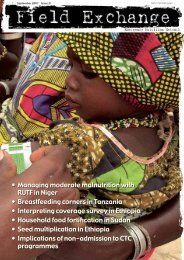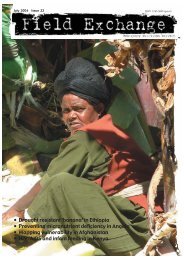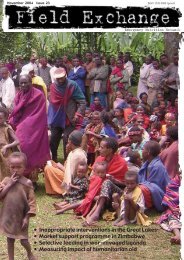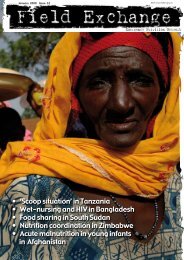Download a PDF of this issue - Field Exchange - Emergency ...
Download a PDF of this issue - Field Exchange - Emergency ...
Download a PDF of this issue - Field Exchange - Emergency ...
You also want an ePaper? Increase the reach of your titles
YUMPU automatically turns print PDFs into web optimized ePapers that Google loves.
Evaluation<br />
Temporary shelters nearing<br />
completion at Tabarre<br />
Roisin Gallagher/Concern, Haiti 2011<br />
Interviews showed they had an astute understanding<br />
<strong>of</strong> both the resource requirements<br />
that coordination commitments place on the<br />
organisation but also the opportunity <strong>this</strong><br />
provides to influence the humanitarian<br />
response far beyond what Concern could<br />
achieve through other means. While some<br />
members <strong>of</strong> the humanitarian community<br />
may dismiss the value <strong>of</strong> coordination as<br />
being too time-consuming, it is the way <strong>of</strong><br />
doing humanitarian business. In contexts such<br />
as Haiti, it is essential for prioritising assistance<br />
and avoiding duplication. The team has<br />
used the forum that the clusters <strong>of</strong>fer for raising<br />
<strong>issue</strong>s <strong>of</strong> concern to the wider<br />
humanitarian community such as protection,<br />
shelter design <strong>issue</strong>s and the threat <strong>of</strong> forced<br />
evictions. Interviews with Cluster<br />
Coordinators highlighted the value they placed<br />
on Concern’s participation, as well as the<br />
important contribution that staff members have<br />
made to the work <strong>of</strong> the clusters.<br />
Lessons learned<br />
Concern’s response in Haiti has necessitated<br />
interventions that have either been unprecedented<br />
or provide the potential to lead the<br />
organisation in new directions or challenge<br />
current ways <strong>of</strong> working.<br />
Responding to urban disasters<br />
Humanitarian organisations in Haiti have<br />
struggled to make their earthquake responses<br />
63<br />
Cleaning drains as part<br />
<strong>of</strong> Cash for Work<br />
Roisin Gallagher/Concern, Haiti 2011<br />
relevant to the urban environment. While<br />
‘camps’ are <strong>of</strong>ten administratively more easy<br />
to support, the lack <strong>of</strong> space and the infiltration<br />
<strong>of</strong> powerful gangs into the over-crowded<br />
urban environments has created a significant<br />
challenge to agencies who are more used to<br />
working in peri-urban or rural environments.<br />
The lesson here may be to stretch humanitarian<br />
comfort zones and look at methodologies<br />
to support smaller and more decentralised<br />
settlements that focus on the importance <strong>of</strong><br />
community, that benefit from strong links with<br />
local authorities and which have strong links<br />
with the private sector to ease the process and<br />
sustainability <strong>of</strong> handing over services. In<br />
seeking to address these <strong>issue</strong>s directly, the<br />
approach taken by Concern in Tabarre Issa<br />
camps has much to <strong>of</strong>fer. In working with both<br />
resettled and host communities, and in trying<br />
to plan the settlement less as a regimented<br />
camp, Concern’s programme has taken a<br />
‘neighbourhood’ or ‘community’ approach<br />
which is considered as best practice by many in<br />
the cluster.<br />
Innovative approaches to addressing<br />
vulnerability: The Baby Tent Programme<br />
Haiti is the first humanitarian response where<br />
the concept <strong>of</strong> ‘baby tents’ has been delivered<br />
to scale, in a context where women had<br />
suffered significant trauma and where the use<br />
<strong>of</strong> infant formula was <strong>of</strong>ten prioritised over<br />
breastfeeding practices. The Baby Tents were a<br />
space which <strong>of</strong>fered privacy, care and counselling<br />
and which could advocate for, educate<br />
and support women on breastfeeding. Where<br />
infants were not breastfed, the baby tents<br />
monitored the use <strong>of</strong> infant formula. Thus they<br />
provided potentially life-saving services for<br />
both breastfed and non-breastfed infants.<br />
A high value placed on an independent<br />
procurement capacity<br />
An important lesson has come from trialling<br />
the United Nations Humanitarian Response<br />
Depot (HRD) which is available for both prepositioning<br />
<strong>of</strong> stock items and procurement.<br />
Experience from the earthquake response<br />
strongly suggests the need for Concern to<br />
retain an independent procurement capacity<br />
as quotes from the HRD procurement agency<br />
were found to be uncompetitive and lead<br />
times were considered to be lengthy. While the<br />
initial reliance on air freight has a significant<br />
cost attached to it, it did ensure that the<br />
programme could scale-up swiftly and<br />
ensured that minimum quality standards for<br />
procured items were met.<br />
Review <strong>of</strong><br />
Integrated<br />
Food Security<br />
Programme<br />
in Malawi<br />
Summary <strong>of</strong> published review 1<br />
Areview <strong>of</strong> an Integrated Food<br />
Security Programme (IFSP),<br />
implemented by GTZ 2 in<br />
Malawi from 1997 to 2004, has<br />
recently been published by Tufts<br />
University. The IFSP in Malawi was a<br />
complex, multi-sector activity that sought<br />
to improve food security and nutrition in<br />
one <strong>of</strong> the country’s most vulnerable,<br />
least-performing regions. The<br />
programme was implemented by GTZ<br />
(now GIZ) 3 on behalf <strong>of</strong> the German<br />
Federal Ministry for Economic<br />
Cooperation and Development (BMZ)<br />
between 1996 and 2003 (with a 12-month<br />
extension supported by the European<br />
Union).<br />
The IFSP’s end-line evaluation<br />
reported that the intervention had<br />
achieved its objectives. A subsequent<br />
review was undertaken to consider<br />
whether gains made in the past had been<br />
sustained and to draw lessons from <strong>this</strong><br />
example that may contribute to new<br />
thinking on models <strong>of</strong> integrated, multisectoral<br />
programming. The review<br />
highlights that “food security approaches<br />
to nutrition require systemic, multidisciplinary<br />
and inter-sectoral approaches”<br />
(UN Standing Committee on Nutrition,<br />
2009, p. 1). It goes on to argue that the<br />
empirical evidence remains limited <strong>of</strong><br />
what actually works on the ground,<br />
where attempts are made to introduce<br />
packages <strong>of</strong> interventions that address<br />
multiple sectors at once.<br />
This review was conducted over a<br />
period <strong>of</strong> five months (November 2010<br />
through March 2011) and involved two<br />
field trips. The findings presented in the
















